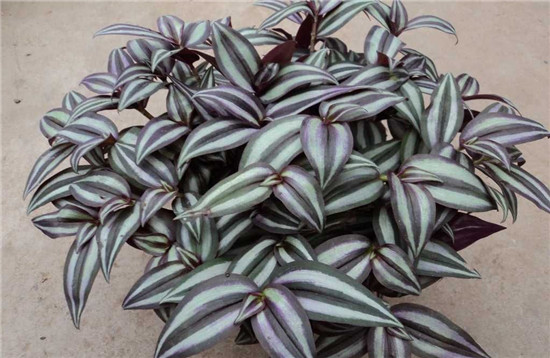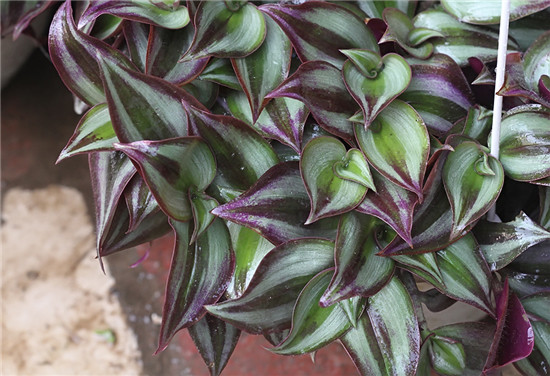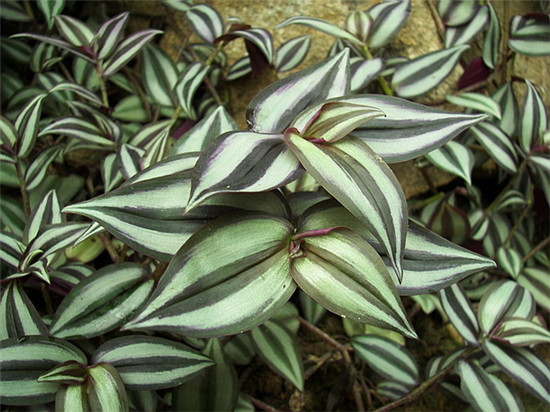Planting of Prunus mume maintenance of Prunus mume
Hanging bamboo plum is a common green plant, which can be seen everywhere in homes, courtyards and even roadsides. Next, let's take a look at the planting of hanging bamboo plum.

Hanging bamboo plum, also known as hanging bamboo orchid, spotted leaf duckweed, flower and leaf bamboo pick up food, red lotus and so on. Caryophyllaceae, Chimonanthus, Prunus. Originally from Mexico. Diaozhumei, a perennial herb. Stem slightly weak, green, pendulous, semi-fleshy, branched, rooting at nodes. Oblong, scattered or dangling, ca. 1 m long, bald or sparsely hairy.
Leaves sessile, elliptic-ovate to rectangular-orbicular, 3-6 cm long and 2 cm wide, apex mucronate, upper purple-green mixed with silver-white, middle margin purple striped, purple-red below, top and base of sheath or all sparsely long-haired. Florets white axillary. Flowers agglomerate in large and small terminal bract-like leaves. Sepals 3, connate into a cylindrical tube, ca. 5 mm; Corolla tube white, slender, ca. 1 cm, lobes 3, rose, ca. 2.5 mm, stamens 5, ovary 3-loculed. The fruit is a capsule. The florescence is uncertain.
Hanging bamboo plum, the stem is soft and fragile, and the Portuguese creeping ground shows trailing growth. The common ones are four-color hanging bamboo plum: the leaf surface is dark green, with red, pink and white stripes, and the leaf back is purple. Different color hanging bamboo plum: the leaf surface is green, there are two obvious silver stripes. Small hanging bamboo plum: the leaves are small and the plants are smaller than the original species. Purple hanging bamboo plum: the leaf shape and flower are basically the same as hanging bamboo plum. The plant shape of purple hanging bamboo plum is slightly larger than that of four-color bamboo plum, and the leaf base is hairy. The leaves are dark green and red wine, with no white stripes.

Culture method of Diaozhu Mei
1. Soil: Dianzhu plum has strong adaptability and does not have high requirements for soil, but it grows better in fertile and loose soil.
2. Sunshine: Diaozhumei is afraid of strong light, so it needs to be maintained in the semi-shade, or give it 70% shade. For indoor maintenance, put it in a brightly lit place as far as possible, and move to outdoor semi-shade or shade for a month every one or two months to accumulate nutrients and restore growth.
3. Temperature: the optimum growth temperature of Phyllostachys pubescens is 18 ℃-30 ℃, avoid cold frost, the overwintering temperature needs to be kept above 10 ℃, and go into dormancy when the temperature drops below 4 ℃ in winter. If the ambient temperature is close to 0 ℃, it will die of frostbite.
4. Fertilization: Dianzhu plum requires more fertilizer and water, but it is most afraid of random fertilization, concentrated fertilizer and partial application of nitrogen, phosphorus and potash fertilizer. It is required to follow the principle of "frequent application of light fertilizer, less amount and more times, and complete nutrition".
5. Pruning: if the plant has been cultivated for too long, the basal leaves often fall off, which affects the ornamental. At this time, the overlong branches and leaves should be cut off to promote the new buds at the base of the stem to sprout and grow new branches and leaves.

The function of Diaozhumei
The function of hanging bamboo plum: 1. Decorate the home
Hanging bamboo plum grows rapidly, the branches and leaves are creeping and hanging, the leaves are purple, green and silver alternately, dazzling, planted with potted plants, placed on several high shelves, the top of the cabinet is allowed to droop naturally, forming a green curtain, the appreciation effect is very good, do not have a mood, home, courtyard and other places are often used for overall layout.
The function of hanging bamboo plum: 2. Fresh air
The plants more or less have the function of fresh air, and the hanging bamboo plum is no exception, and the growth of the hanging bamboo plum is exuberant, so it is a kind of herbaceous foliage plant which is very suitable for little investment, and the land is covered with greening quickly and well. The air is also relatively fresh in large areas covered with hanging bamboo plums.

The function of Diaozhumei: 3. Medicinal value
Phyllostachys angustifolia is a perennial herb of the family Caryophyllaceae, also known as Phyllostachys pubescens, Phyllostachys pubescens, purple back duckweed, with the functions of heat-clearing and detoxification, cooling blood and hemostasis, diuresis, mainly clearing heat and dampness, cooling blood and detoxification, main non-swollen, unfavorable urination, gonorrhea, dysentery, lower band, hemoptysis, red swelling and pain, sore throat, sore carbuncle, burn and scald, venomous snake bite and so on.
The above is the whole content of the planting and maintenance of Diaozhumei, which I summarized for you. I hope this article can help you. Please continue to follow us.
Related
- Wuhan Hospital Iron Tree Blooming Result Was Instantly Frightened by the Gardener Master
- Which variety of camellia is the most fragrant and best? Which one do you like best?
- What is the small blue coat, the breeding methods and matters needing attention of the succulent plant
- Dormancy time and maintenance management of succulent plants during dormancy
- Minas succulent how to raise, Minas succulent plant pictures
- What are the varieties of winter succulent plants
- How to raise succulent plants in twelve rolls? let's take a look at some experience of breeding twelve rolls.
- Attention should be paid to water control for succulent plants during dormant period (winter and summer)
- Watering experience of twelve rolls of succulent plants
- Techniques for fertilizing succulent plants. An article will let you know how to fertilize succulent plants.



